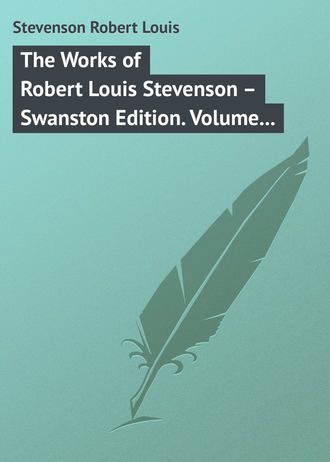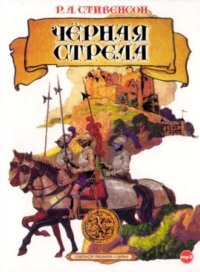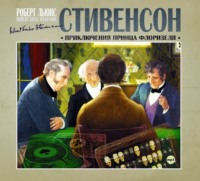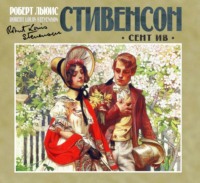 полная версия
полная версияThe Works of Robert Louis Stevenson – Swanston Edition. Volume 5
“Ah, no,” said my father, “never robbed“; and I observed a strange conviction in his tone.
At last, and not long before the blow fell on my unhappy family, I chanced to see the doctor’s house in a new light. My father was ill; my mother confined to his bedside; and I was suffered to go, under the charge of our driver, to the lonely house some twenty miles away, where our packages were left for us. The horse cast a shoe; night overtook us half-way home; and it was well on for three in the morning when the driver and I, alone in a light waggon, came to that part of the road which ran below the doctor’s house. The moon swam clear; the cliffs and mountains in this strong light lay utterly deserted; but the house, from its station on the top of the long slope and close under the bluff, not only shone abroad from every window like a place of festival, but from the great chimney at the west end poured forth a coil of smoke so thick and so voluminous, that it hung for miles along the windless night-air, and its shadow lay far abroad in the moonlight upon the glittering alkali. As we continued to draw near, besides, a regular and panting throb began to divide the silence. First it seemed to me like the beating of a heart; and next it put into my mind the thought of some giant, smothered under mountains, and still, with incalculable effort, fetching breath. I had heard of the railway, though I had not seen it, and I turned to ask the driver if this resembled it. But some look in his eye, some pallor, whether of fear or moonlight on his face, caused the words to die upon my lips. We continued, therefore, to advance in silence, till we were close below the lighted house; when suddenly, without premonitory rustle, there burst forth a report of such a bigness that it shook the earth and set the echoes of the mountains thundering from cliff to cliff. A pillar of amber flame leaped from the chimney-top and fell in multitudes of sparks; and at the same time the lights in the windows turned for one instant ruby red and then expired. The driver had checked his horse instinctively, and the echoes were still rumbling farther off among the mountains, when there broke from the now darkened interior a series of yells – whether of man or woman it was impossible to guess – the door flew open, and there ran forth into the moonlight, at the top of the long slope, a figure clad in white, which began to dance and leap and throw itself down, and roll as if in agony, before the house. I could no more restrain my cries; the driver laid his lash about the horse’s flank, and we fled up the rough track at the peril of our lives; and did not draw rein till, turning the corner of the mountain, we beheld my father’s ranch and deep, green groves and gardens, sleeping in the tranquil light.
This was the one adventure of my life, until my father had climbed to the very topmost point of material prosperity, and I myself had reached the age of seventeen. I was still innocent and merry like a child; tended my garden or ran upon the hills in glad simplicity; gave not a thought to coquetry or to material cares; and if my eye rested on my own image in a mirror or some sylvan spring, it was to seek and recognise the features of my parents. But the fears which had long pressed on others were now to be laid on my youth. I had thrown myself, one sultry, cloudy afternoon, on a divan; the windows stood open on the verandah, where my mother sat with her embroidery; and when my father joined her from the garden, their conversation, clearly audible to me, was of so startling a nature that it held me enthralled where I lay.
“The blow has come,” my father said, after a long pause.
I could hear my mother start and turn, but in words she made no reply.
“Yes,” continued my father, “I have received to-day a list of all that I possess; of all, I say; of what I have lent privately to men whose lips are sealed with terror; of what I have buried with my own hand on the bare mountain, when there was not a bird in heaven. Does the air, then, carry secrets? Are the hills of glass? Do the stones we tread upon preserve the footprint to betray us? Oh, Lucy, Lucy, that we should have come to such a country!”
“But this,” returned my mother, “is no very new or very threatening event. You are accused of some concealment. You will pay more taxes in the future, and be mulcted in a fine. It is disquieting, indeed, to find our acts so spied upon, and the most private known. But is this new? Have we not long feared and suspected every blade of grass?”
“Ay, and our shadows!” cried my father. “But all this is nothing. Here is the letter that accompanied the list.”
I heard my mother turn the pages; and she was some time silent.
“I see,” she said at last; and then, with the tone of one reading; “’From a believer so largely blessed by Providence with this world’s goods,’” she continued, “’the Church awaits in confidence some signal mark of piety.’ There lies the sting. Am I not right? These are the words you fear?”
“These are the words,” replied my father. “Lucy, you remember Priestley? Two days before he disappeared, he carried me to the summit of an isolated butte; we could see around us for ten miles; sure, if in any quarter of this land a man were safe from spies, it were in such a station; but it was in the very ague-fit of terror that he told me, and that I heard, his story. He had received a letter such as this; and he submitted to my approval an answer in which he offered to resign a third of his possessions. I conjured him, as he valued life, to raise his offering; and, before we parted, he had doubled the amount. Well, two days later he was gone – gone from the chief street of the city in the hour of noon – and gone for ever. O God!” cried my father, “by what art do they thus spirit out of life the solid body? What death do they command that leaves no traces? that this material structure, these strong arms, this skeleton that can resist the grave for centuries, should be thus reft in a moment from the world of sense? A horror dwells in that thought more awful than mere death.”
“Is there no hope in Grierson?” asked my mother.
“Dismiss the thought,” replied my father. “He now knows all that I can teach, and will do naught to save me. His power, besides, is small, his own danger not improbably more imminent than mine; for he, too, lives apart; he leaves his wives neglected and unwatched; he is openly cited for an unbeliever; and unless he buys security at a more awful price – but no; I will not believe it: I have no love for him, but I will not believe it.”
“Believe what?” asked my mother; and then, with a change of note, “But oh, what matters it?” she cried. “Abimelech, there is but one way open: we must fly!”
“It is in vain,” returned my father. “I should but involve you in my fate. To leave this land is hopeless: we are closed in it as men are closed in life; and there is no issue but the grave.”
“We can but die then,” replied my mother. “Let us at least die together. Let not Asenath2 and myself survive you. Think to what a fate we should be doomed!”
My father was unable to resist her tender violence; and though I could see he nourished not one spark of hope, he consented to desert his whole estate, beyond some hundreds of dollars that he had by him at the moment, and to flee that night, which promised to be dark and cloudy. As soon as the servants were asleep, he was to load two mules with provisions; two others were to carry my mother and myself; and, striking through the mountains by an unfrequented trail, we were to make a fair stroke for liberty and life. As soon as they had thus decided, I showed myself at the window, and, owning that I had heard all, assured them that they could rely on my prudence and devotion. I had no fear, indeed, but to show myself unworthy of my birth; I held my life in my hand without alarm; and when my father, weeping upon my neck, had blessed Heaven for the courage of his child, it was with a sentiment of pride and some of the joy that warriors take in war, that I began to look forward to the perils of our flight.
Before midnight, under an obscure and starless heaven, we had left far behind us the plantations of the valley, and were mounting a certain cañon in the hills, narrow, encumbered with great rocks, and echoing with the roar of a tumultuous torrent. Cascade after cascade thundered and hung up its flag of whiteness in the night, or fanned our faces with the wet wind of its descent. The trail was break-neck, and led to famine-guarded deserts; it had been long since deserted for more practicable routes; and it was now a part of the world untrod from year to year by human footing. Judge of our dismay when, turning suddenly an angle of the cliffs, we found a bright bonfire blazing by itself under an impending rock; and on the face of the rock, drawn very rudely with charred wood, the great Open Eye which is the emblem of the Mormon faith. We looked upon each other in the firelight; my mother broke into a passion of tears; but not a word was said. The mules were turned about; and leaving that great eye to guard the lonely cañon, we retraced our steps in silence. Day had not yet broken ere we were once more at home, condemned beyond reprieve.
What answer my father sent I was not told; but two days later, a little before sundown, I saw a plain, honest-looking man ride slowly up the road in a great pother of dust. He was clad in homespun, with a broad straw hat; wore a patriarchal beard; and had an air of a simple rustic farmer, that was, in my eyes, very reassuring. He was, indeed, a very honest man and pious Mormon; with no liking for his errand, though neither he nor any one in Utah dared to disobey; and it was with every mark of diffidence that he had had himself announced as Mr. Aspinwall, and entered the room where our unhappy family was gathered. My mother and me he awkwardly enough dismissed; and as soon as he was alone with my father laid before him a blank signature of President Young’s, and offered him a choice of services: either to set out as a missionary to the tribes about the White Sea, or to join the next day, with a party of Destroying Angels, in the massacre of sixty German immigrants. The last, of course, my father could not entertain, and the first he regarded as a pretext: even if he could consent to leave his wife defenceless, and to collect fresh victims for the tyranny under which he was himself oppressed, he felt sure he would never be suffered to return. He refused both; and Aspinwall, he said, betrayed sincere emotion, part religious, as the spectacle of such disobedience, but part human, in pity for my father and his family. He besought him to reconsider his decision; and at length, finding he could not prevail, gave him till the moon rose to settle his affairs, and say farewell to wife and daughter. “For,” said he, “then, at the latest, you must ride with me.”
I dare not dwell upon the hours that followed: they fled all too fast; and presently the moon out-topped the eastern range, and my father and Mr. Aspinwall set forth, side by side, on their nocturnal journey. My mother, though still bearing an heroic countenance, had hastened to shut herself in her apartment, thenceforward solitary; and I, alone in the dark house, and consumed by grief and apprehension, made haste to saddle my Indian pony, to ride up to the corner of the mountain, and to enjoy one farewell sight of my departing father. The two men had set forth at a deliberate pace; nor was I long behind them, when I reached the point of view. I was the more amazed to see no moving creature in the landscape. The moon, as the saying is, shone bright as day; and nowhere, under the whole arch of night, was there a growing tree, a bush, a farm, a patch of tillage, or any evidence of man, but one. From the corner where I stood, a rugged bastion of the line of bluffs concealed the doctor’s house; and across the top of that projection the soft night wind carried and unwound about the hills a coil of sable smoke. What fuel could produce a vapour so sluggish to dissipate in that dry air, or what furnace pour it forth so copiously, I was unable to conceive; but I knew well enough that it came from the doctor’s chimney; I saw well enough that my father had already disappeared; and in despite of reason, I connected in my mind the loss of that dear protector with the ribbon of foul smoke that trailed along the mountains.
Days passed, and still my mother and I waited in vain for news; a week went by, a second followed, but we heard no word of the father and husband. As smoke dissipates, as the image glides from the mirror, so in the ten or twenty minutes that I had spent in getting my horse and following upon his trail, had that strong and brave man vanished out of life. Hope, if any hope we had, fled with every hour; the worst was now certain for my father, the worst was to be dreaded for his defenceless family. Without weakness, with a desperate calm at which I marvel when I look back upon it, the widow and the orphan awaited the event. On the last day of the third week we rose in the morning to find ourselves alone in the house, alone, so far as we searched, on the estate; all our attendants, with one accord, had fled, and as we knew them to be gratefully devoted, we drew the darkest intimations from their flight. The day passed, indeed, without event; but in the fall of the evening we were called at last into the verandah by the approaching clink of horse’s hoofs.
The doctor, mounted on an Indian pony, rode into the garden, dismounted, and saluted us. He seemed much more bent, and his hair more silvery than ever; but his demeanour was composed, serious, and not unkind.
“Madam,” said he, “I am come upon a weighty errand; and I would have you recognise it as an effect of kindness in the President, that he should send as his ambassador your only neighbour and your husband’s oldest friend in Utah.”
“Sir,” said my mother, “I have but one concern, one thought. You know well what it is. Speak: my husband?”
“Madam,” returned the doctor, taking a chair on the verandah, “if you were a silly child my position would now be painfully embarrassing. You are, on the other hand, a woman of great intelligence and fortitude: you have, by my forethought, been allowed three weeks to draw your own conclusions and to accept the inevitable. Further words from me are, I conceive, superfluous.”
My mother was as pale as death, and trembled like a reed; I gave her my hand, and she kept it in the folds of her dress and wrung it till I could have cried aloud. “Then, sir,” said she at last, “you speak to deaf ears. If this be indeed so, what have I to do with errands? what do I ask of Heaven but to die?”
“Come,” said the doctor, “command yourself. I bid you dismiss all thoughts of your late husband, and bring a clear mind to bear upon your own future and the fate of that young girl.”
“You bid me dismiss – ” began my mother. “Then you know!” she cried.
“I know,” replied the doctor.
“You know?” broke out the poor woman. “Then it was you who did the deed! I tear off the mask, and with dread and loathing see you as you are – you, whom the poor fugitive beholds in nightmares, and awakes raving – you, the Destroying Angel!”
“Well, madam, and what then?” returned the doctor. “Have not my fate and yours been similar? Are we not both immured in this strong prison of Utah? Have you not tried to flee, and did not the Open Eye confront you in the cañon? Who can escape the watch of that unsleeping eye of Utah? Not I, at least. Horrible tasks have, indeed, been laid upon me; and the most ungrateful was the last; but had I refused my offices, would that have spared your husband? You know well it would not. I, too, had perished along with him; nor would I have been able to alleviate his last moments, nor could I to-day have stood between his family and the hand of Brigham Young.”
“Ah!” cried I, “and could you purchase life by such concessions?”
“Young lady,” answered the doctor, “I both could and did; and you will live to thank me for that baseness. You have a spirit, Asenath, that it pleases me to recognise. But we waste time. Mr. Fonblanque’s estate reverts, as you doubtless imagine, to the church; but some part of it has been reserved for him who is to marry the family; and that person, I should perhaps tell you without more delay, is no other than myself.”
At this odious proposal my mother and I cried out aloud, and clung together like lost souls.
“It is as I supposed,” resumed the doctor, with the same measured utterance. “You recoil from this arrangement. Do you expect me to convince you? You know very well that I have never held the Mormon view of women. Absorbed in the most arduous studies, I have left the slatterns whom they call my wives to scratch and quarrel among themselves; of me, they have had nothing but my purse; such was not the union I desired, even if I had the leisure to pursue it. No, you need not, madam, and my old friend – ” and here the doctor rose and bowed with something of gallantry – “you need not apprehend my importunities. On the contrary, I am rejoiced to read in you a Roman spirit; and if I am obliged to bid you follow me at once, and that in the name, not of my wish, but of my orders, I hope it will be found that we are of a common mind.”
So, bidding us dress for the road, he took a lamp (for the night had now fallen) and set off to the stable to prepare our horses.
“What does it mean? – what will become of us?” I cried.
“Not that, at least,” replied my mother, shuddering. “So far we can trust him. I seem to read among his words a certain tragic promise. Asenath, if I leave you, if I die, you will not forget your miserable parents?”
Thereupon we fell to cross-purposes: I beseeching her to explain her words; she putting me by, and continuing to recommend the doctor for a friend. “The doctor!” I cried at last; “the man who killed my father?”
“Nay,” said she, “let us be just. I do believe, before Heaven, he played the friendliest part. And he alone, Asenath, can protect you in this land of death.”
At this the doctor returned, leading our two horses; and when we were all in the saddle, he bade me ride on before, as he had matter to discuss with Mrs. Fonblanque. They came at a foot’s-pace, eagerly conversing in a whisper; and presently after the moon rose and showed them looking eagerly into each other’s faces as they went, my mother laying her hand upon the doctor’s arm, and the doctor himself, against his usual custom, making vigorous gestures of protest or asseveration.
At the foot of the track which ascended the talus of the mountain to his door, the doctor overtook me at a trot.
“Here,” he said, “we shall dismount; and as your mother prefers to be alone, you and I shall walk together to my house.”
“Shall I see her again?” I asked.
“I give you my word,” he said, and helped me to alight. “We leave the horses here,” he added. “There are no thieves in this stone wilderness.”
The track mounted gradually, keeping the house in view. The windows were once more bright; the chimney once more vomited smoke; but the most absolute silence reigned, and, but for the figure of my mother very slowly following in our wake, I felt convinced there was no human soul within a range of miles. At the thought, I looked upon the doctor, gravely walking by my side, with his bowed shoulders and white hair, and then once more at his house, lit up and pouring smoke like some industrious factory. And then my curiosity broke forth. “In Heaven’s name,” I cried, “what do you make in this inhuman desert?”
He looked at me with a peculiar smile, and answered with an evasion:
“This is not the first time,” said he, “that you have seen my furnaces alight. One morning, in the small hours, I saw you driving past; a delicate experiment miscarried; and I cannot acquit myself of having startled either your driver or the horse that drew you.”
“What!” cried I, beholding again in fancy the antics of the figure, “could that be you?”
“It was I,” he replied; “but do not fancy that I was mad. I was in agony. I had been scalded cruelly.”
We were now near the house, which, unlike the ordinary houses of the country, was built of hewn stone and very solid. Stone, too, was its foundation, stone its background. Not a blade of grass sprouted among the broken mineral about the walls, not a flower adorned the windows. Over the door, by way of sole adornment, the Mormon Eye was rudely sculptured; I had been brought up to view that emblem from my childhood; but since the night of our escape, it had acquired a new significance, and set me shrinking. The smoke rolled voluminously from the chimney-top, its edges ruddy with the fire; and from the far corner of the building, near the ground, angry puffs of steam shone snow-white in the moon and vanished.
The doctor opened the door and paused upon the threshold. “You ask me what I make here,” he observed: “Two things: Life and Death.” And he motioned me to enter.
“I shall await my mother,” said I.
“Child,” he replied, “look at me: am I not old and broken? Of us two, which is the stronger, the young maiden or the withered man?”
I bowed and, passing by him, entered a vestibule or kitchen, lit by a good fire and a shaded reading-lamp. It was furnished only with a dresser, a rude table, and some wooden benches; and on one of these the doctor motioned me to take a seat; and passing by another door into the interior of the house, he left me to myself. Presently I heard the jar of iron from the far end of the building; and this was followed by the same throbbing noise that had startled me in the valley, but now so near at hand as to be menacing by loudness, and even to shake the house with every recurrence of the stroke. I had scarce time to master my alarm when the doctor returned, and almost in the same moment my mother appeared upon the threshold. But how am I to describe to you the peace and ravishment of that face? Years seemed to have passed over her head during that brief ride, and left her younger and fairer; her eyes shone, her smile went to my heart; she seemed no more a woman, but the angel of ecstatic tenderness. I ran to her in a kind of terror; but she shrank a little back and laid her finger on her lips, with something arch and yet unearthly. To the doctor, on the contrary, she reached out her hand as to a friend and helper; and so strange was the scene that I forgot to be offended.
“Lucy,” said the doctor, “all is prepared. Will you go alone, or shall your daughter follow us?”
“Let Asenath come,” she answered, “dear Asenath! At this hour when I am purified of fear and sorrow, and already survive myself and my affections, it is for your sake, and not for mine, that I desire her presence. Were she shut out, dear friend, it is to be feared she might misjudge your kindness.”
“Mother,” I cried wildly, “mother, what is this?”
But my mother, with her radiant smile, said only “Hush!” as though I were a child again, and tossing in some fever-fit; and the doctor bade me be silent and trouble her no more. “You have made a choice,” he continued, addressing my mother, “that has often strangely tempted me. The two extremes: all, or else nothing; never, or this very hour upon the clock – these have been my incongruous desires. But to accept the middle term, to be content with a half-gift, to flicker awhile and to burn out – never for an hour, never since I was born, has satisfied the appetite of my ambition.” He looked upon my mother fixedly, much of admiration and some touch of envy in his eyes; then, with a profound sigh, he led the way into the inner room.
It was very long. From end to end it was lit up by many lamps, which by the changeful colour of their light, and by the incessant snapping sounds with which they burned, I have since divined to be electric. At the extreme end an open door gave us a glimpse into what must have been a lean-to shed beside the chimney; and this, in strong contrast to the room, was painted with a red reverberation as from furnace-doors. The walls were lined with books and glazed cases, the tables crowded with the implements of chemical research; great glass accumulators glittered in the light; and through a hole in the gable near the shed door a heavy driving-belt entered the apartment and ran overhead upon steel pulleys, with clumsy activity and many ghostly and fluttering sounds. In one corner I perceived a chair resting upon crystal feet, and curiously wreathed with wire. To this my mother advanced with a decisive swiftness.
“Is this it?” she asked.






